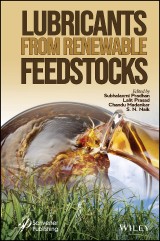Details
Lubricants from Renewable Feedstocks
1. Aufl.
|
203,99 € |
|
| Verlag: | Wiley |
| Format: | |
| Veröffentl.: | 18.06.2024 |
| ISBN/EAN: | 9781394173020 |
| Sprache: | englisch |
| Anzahl Seiten: | 512 |
DRM-geschütztes eBook, Sie benötigen z.B. Adobe Digital Editions und eine Adobe ID zum Lesen.
Beschreibungen
<p><b>Written and edited by a team of industry experts, this exciting new volume covers the field of renewable lubricants, their processing, optimization, end-use application, and their future potential.</b> <p>Biolubricants are a viable alternative to synthetic lubricants because they are produced from organic materials such as plant oils, waste oils and by-products. Renewable biolubricants are the subject of research because of their biodegradability, eco-friendliness, and favorable socioeconomic consequences to counteract imitations of synthetic lubricants. Biolubricants have thus emerged as an ideal substitute for mineral oil-based lubricants, as significant economic and environmental acceptability has been received over the last few decades and it has been estimated that there would be a further steady growth in its demand over the next few decades. Furthermore, biolubricants’ high-quality lubricating properties, high load carrying ability, long service life, and fast biodegradability have expanded the recent interest. These lubricants can be derived from different sources of vegetable oils, non-edible oils, waste cooking oils (WCO) and microbe-derived oils. Among all these sources, the use of WCOs and microbe-derived oils have received immense interest and provide superior quality biolubricants. <p>This outstanding new volume covers the prospects and processing of feedstocks for biolubricants, extraction techniques, new advancements in the field of bio-based lubricants, epoxide lubricants, hydrogenated lubricants, microbial-based biolubricants, nano-biolubricants, polyester-based biolubricants, lubricants from waste oils and waste materials, its economic and environmental acceptability and biorefinery approaches. The book will be helpful to industry professionals and engineers of all types, students, and other stakeholders working in the field of lubricant, chemical engineering, mechanical engineering and material science, tribological sectors and biorefinery industries. It will also be of great interest to new start-up companies working in the area of processing feedstocks for biolubricant production and end use application, biorefineries, valorization of biolubricant waste, and in the recycling industries.
<p><b>Subhalaxmi Pradhan</b>, PhD, is an associate professor at Division of Chemistry, School of Basic Sciences, Galgotias University Greater Noida, UP. She has three years of postdoctoral experience from the University of Saskatchewan, Canada and IIT Delhi and 12 years of experience in research and teaching. She has three patents and has published over 40 research papers in scientific journals. She has also edited the book, <i>Biofuel Extraction Techniques</i>, available from Wiley-Scrivener. <p><b>Lalit Prasad </b>has a PhD from the Indian Institute of Technology Delhi, India. Presently he is serving as a professor of chemistry at the School of Basic Sciences, Galgotias University, Greater Noida, Uttar Pradesh, India. He has more than a decade teaching and research experience and has published more than 30 research papers book chapters in scientific journals and books. <p><b>Chandu Madankar</b>,PhD, is an assistant professor at the Department of Oils, Oleochemicals and Surfactants Technology, Institute of Chemical Technology, Mumbai, India. He earned his PhD in 2015 from IIT Delhi and was awarded the Canadian Commonwealth Fellowship in the Department of Chemical & Biological Engineering, University of Saskatchewan, Canada. He has eight years of experience of research and teaching and has published more than 25 research papers in scientific journals. <p><b>S. N. Naik</b>, PhD, is an emeritus professor at the Centre for Rural Development and Technology, IIT Delhi, India. He has more than 35 years of experience in research and teaching. He has several prestigious awards and has published nearly 250 papers in scientific journals. He also has seven patents to his credit and has authored three books.
<p><b>Written and edited by a team of industry experts, this exciting new volume covers the field of renewable lubricants, their processing, optimization, end-use application, and their future potential.</b> <p>Biolubricants are a viable alternative to synthetic lubricants because they are produced from organic materials such as plant oils, waste oils and by-products. Renewable biolubricants are the subject of research because of their biodegradability, eco-friendliness, and favorable socioeconomic consequences to counteract imitations of synthetic lubricants. Biolubricants have thus emerged as an ideal substitute for mineral oil-based lubricants, as significant economic and environmental acceptability has been received over the last few decades and it has been estimated that there would be a further steady growth in its demand over the next few decades. Furthermore, biolubricants’ high-quality lubricating properties, high load carrying ability, long service life, and fast biodegradability have expanded the recent interest. These lubricants can be derived from different sources of vegetable oils, non-edible oils, waste cooking oils (WCO) and microbe-derived oils. Among all these sources, the use of WCOs and microbe-derived oils have received immense interest and provide superior quality biolubricants. <p>This outstanding new volume covers the prospects and processing of feedstocks for biolubricants, extraction techniques, new advancements in the field of bio-based lubricants, epoxide lubricants, hydrogenated lubricants, microbial-based biolubricants, nano-biolubricants, polyester-based biolubricants, lubricants from waste oils and waste materials, its economic and environmental acceptability and biorefinery approaches. The book will be helpful to industry professionals and engineers of all types, students, and other stakeholders working in the field of lubricant, chemical engineering, mechanical engineering and material science, tribological sectors and biorefinery industries. It will also be of great interest to new start-up companies working in the area of processing feedstocks for biolubricant production and end use application, biorefineries, valorization of biolubricant waste, and in the recycling industries.
Diese Produkte könnten Sie auch interessieren:

RNA as a Drug Target

von: John Schneekloth, Martin Pettersson, Raimund Mannhold, Helmut Buschmann, Jörg Holenz

142,99 €

















